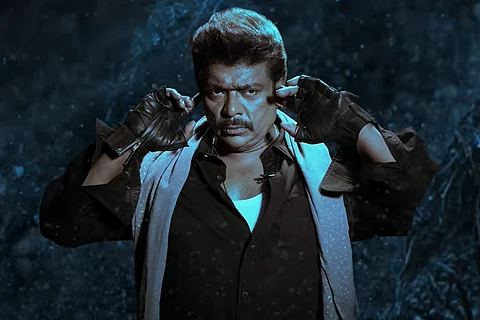

Actor and director Parthiban’s attempt at an entire film made in a single-take is an impressive technical feat. In Iravin Nizhal, he oversees a host of characters, a story shifting back and forth over several years and claustrophobic sets while also starring in the film. Pulling all this together could have been no easy task, even without Parthiban telling you so. But he does. Repeatedly. The first half hour of the film’s run time is taken up by an increasingly dizzying making-of sequence, to the point I was worried I’d accidentally walked in at the end. This is the first single-take non-linear film in the world, we are told. Over and over again. When this sequence is finally over, the film cuts straight to the interval while audience members look around in confusion. Understandably, some didn’t return to their seats. When Iravin Nizhal finally does begin, it quickly collapses into a self-indulgent tale loaded with violent misogyny and rape jokes.
Parthiban plays Nandhu, a ruthless loan shark haunted by his past crimes. As he prepares for a final stand-off with a criminal godman (Robo Shankar) he’d once run afoul off, he tells us his life-story. It's a story that cuts through time and complex sets that have to suggest far flung locations, so the camera has to keep pace without a break. On the technical side that could have had you in awe at the movie-magic being spun in front of your eyes — if only the director hadn’t spent a dull half an hour giving away all his tricks. At some point, an experimental film like this needs to speak for itself. Firstly because few movie-goers want to sit through a grand-standing lecture on the pitfalls of single-take camera work. And secondly, because when the actual film finally plays out, the sub-par script is all the more aggravating.
The film is proud of itself for choosing a non-linear narrative. What it really offers is a chaotic, unconvincing plot. The standoff between Nandhu and the godman-criminal, you’re led to imagine, is the centre point of the plot. So why doesn’t enough time go into building up this enmity? Robo Shankar’s role can almost be labelled as a cameo. He brings his usual brand of humour, but hardly any villainy. His comical portrayal of similar godmen, who in real life con thousands of people, is satisfying as parody. Only, plot wise, it seems completely discordant with how his relationship with Nandhu plays out later.
Anyway, Iravin Nizhal relies on extreme violence, mostly towards women, to tell its story. Nandhu’s is a life of horror and sin, in his own words. Parthiban’s voice over is a steady presence throughout to explain his chaotic script to you. As anchor points across a lifetime of crime are three women: his first love, a ‘perfect’ wife, and a debtor strong-armed into marrying him.
Sneha Kumar plays his first love Lakshmi. After she moves on to a local gangster (Stunt Silva), because he’s financially better off, she is slut-shamed throughout the film. Nadhu later deals her ‘comeuppance’ through an off-screen assault that he narrates to the audience as a rape-joke. When Parthiban describes the gangster his first girlfriend leaves him for, he takes care to mention that the gangster gorges on beef biriyani, whatever that is supposed to signal. It’s not like we’re told the meat in the many other biriyanis mentioned in the film. To put it plainly, the loutish girlfriend-stealing, gangster speaking Madras Tamil is lowered caste, most likely Dalit.
Brigida comes into his life next. Her Chilakkama is deliberately contrasted to Nandhu’s first romance with Lakshmi. Where Lakshmi lives in a cluttered slum, he meets Chilakkama at the temple where she sells flowers. She is “divine”, his “goddess” who has come to briefly reform him. Lakshmi, to be taught a lesson later, is free-spirited about her sex-life. Chilakkama is coy even after marriage — the ideal Kollywood blushing bride. Nandhu and her first-night is described as “pure”.
And finally comes his second wife, played by Sai Priyanka Ruth, bullied into marrying him in place of the debts her family owes him. A wife about whom, too, Nandhu makes marital rape jokes. It takes audacious levels of misogyny on Parthiban’s part to give Sai the following dialogue right after the said joke: “I started caring for you seeing how good a father you are.” The sporadic applause and cackling from some of the audience, as gutting as it was, is just another reminder that rape culture is embedded deeply in our people.
For their part, Sneha Kumar, Brigida and Sai Priyanka Ruth deliver what is expected of each of them: beguiling women meant to be props in the schemes of a terrible man. It’s hard to whole-heartedly praise Parthiban for playing such a riskily dislikeable character, though he does so with aplomb. In the capacity of a filmmaker, he fails utterly to keep you engaged with his story. Nandhu wallows in self-loathing throughout the film, describing himself as “disgusting and sinful” (not that it stops him). Yet, it’s Parthiban, and not his character, you come away feeling repulsed by.
If you’re curious how a movie is made in a single-take, by all means go for Iravin Nizhal. Crew members and stalwarts of Kollywood like Rajinikanth, Bhagiyaraj and Bharathiraaja, will waltz through the making-of sequence to offer their insights on the technical aspects. Even AR Rahman, the film’s music composer, is roped into this gimmick. His score swinging wildly between extreme pathos and high energy, is far too much to take in an already overwhelmingly confused film.
Iravin Nizhal is at the least a crashing bore; at the worst, single-take magic aside, a noxious mix of misogyny and self-indulgence.
Disclaimer: This review was not paid for or commissioned by anyone associated with the series/film. TNM Editorial is independent of any business relationship the organisation may have with producers or any other members of its cast or crew.